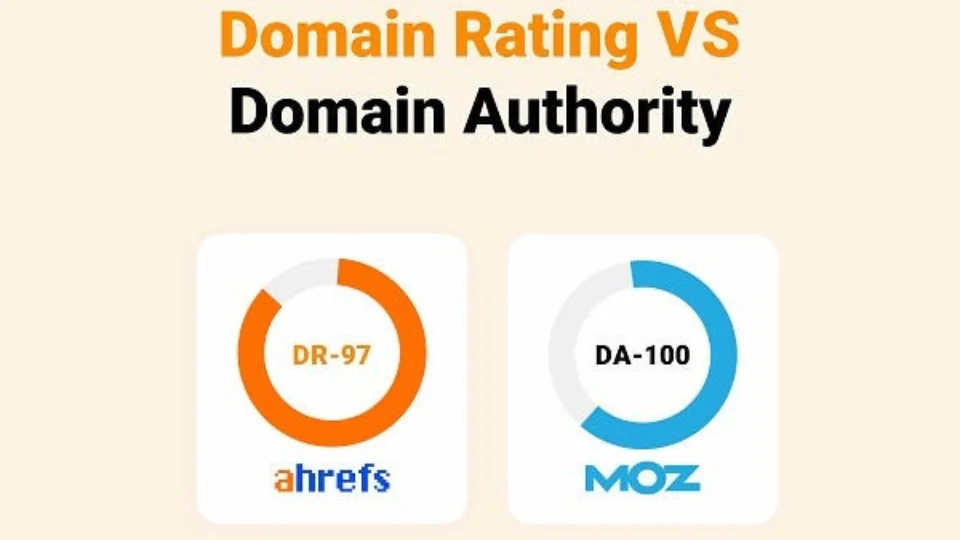Domain Rating vs Domain Authority: What’s the Difference and Why It Matters
When diving into SEO metrics, two terms often come up: Domain Rating (DR) and Domain Authority (DA). Although they sound similar, they come from different tools and have slightly different purposes.
Understanding Domain Rating vs Domain Authority can help you better evaluate your website’s strength and guide your link-building and SEO strategies more effectively.
In this article, we’ll break down the differences, similarities, pros and cons, and when to focus on each metric.
What Is Domain Rating (DR)?

Domain Rating is a metric developed by Ahrefs that measures the strength of a website’s backlink profile compared to all other websites in their database.
Key features of Domain Rating:

- Scored on a scale from 0 to 100.
- Based purely on backlink quantity and quality.
- Higher DR indicates stronger link authority.
- It focuses on external backlinks, not internal SEO factors.
In short, the more high-quality backlinks you have, the higher your DR score.
What Is Domain Authority (DA)?

Domain Authority is a metric developed by Moz that predicts how likely a website is to rank in search engine result pages (SERPs).
Key features of Domain Authority:
- Also scored from 0 to 100.
- Based on multiple factors, including backlinks, linking root domains, and other SEO-related variables.
- DA attempts to mirror Google’s actual ranking algorithm more closely than DR does.
In simple terms, DA is a broader estimation of how “strong” a domain is when it comes to SEO competitiveness.
Domain Rating vs Domain Authority: Key Differences
Here’s a side-by-side comparison to make it even clearer:
| Feature | Domain Rating (DR) | Domain Authority (DA) |
|---|---|---|
| Created by | Ahrefs | Moz |
| Focus | Strength of backlink profile | Overall ranking potential |
| Factors Considered | Quantity & quality of backlinks | Backlinks, content, SEO signals |
| Calculation Complexity | More backlink-specific | Broader SEO metrics |
| Use Case | Link building & site authority | Ranking prediction & SEO audits |
| Update Frequency | Regularly updated | Regularly updated |
Why Do These Metrics Matter?
Both Domain Rating and Domain Authority offer insights into the health and authority of a website, but they serve slightly different purposes.
Domain Rating is useful for:
- Evaluating the strength of backlink profiles.
- Finding quality link-building opportunities.
- Comparing your site to competitors in terms of link power.
Domain Authority is useful for:
- Predicting how well your site might rank.
- Auditing your overall SEO performance.
- Tracking competitive SEO progress.
How Are Domain Rating and Domain Authority Calculated?
Domain Rating:
- Looks primarily at the number of unique domains linking to a website.
- Focuses on the strength of these links (high DR sites linking to you have more weight).
- Internal links and content quality are not directly factored in.
Domain Authority:
- Incorporates link profile strength, internal linking, site structure, content relevance, and more.
- Uses machine learning models based on how often your domain shows up in Google’s SERPs.
Important Note:
Neither DR nor DA is used by Google. They are third-party metrics meant to help SEO professionals gauge website strength.
Pros and Cons of Domain Rating and Domain Authority
Pros of Domain Rating
- Easy to understand and use.
- Helps focus strictly on backlinks.
- Ideal for link-building campaigns.
Cons of Domain Rating
- Ignores on-page SEO and content.
- A high DR doesn’t guarantee high rankings.
- Vulnerable to manipulation through mass link-building.
Pros of Domain Authority
- Broader SEO perspective, including content and links.
- Good for competitive analysis.
- Aligns better with ranking potential.
Cons of Domain Authority
- Complex calculation can sometimes seem less transparent.
- Easier for fluctuations to occur with updates.
- Can be slower to reflect changes compared to DR.
How to Improve Your Domain Rating and Domain Authority
Boosting Domain Rating
- Build high-quality backlinks from relevant, high-authority websites.
- Focus on earning links rather than buying them.
- Diversify your backlink profile (avoid too many links from the same source).
Boosting Domain Authority
- Create high-quality, engaging content.
- Optimize on-page SEO (titles, meta descriptions, internal linking).
- Gain quality backlinks.
- Improve technical SEO aspects like site speed and mobile-friendliness.
Frequently Asked Questions (FAQ)
Is Domain Rating better than Domain Authority?
Neither is better; they measure different aspects. DR is more focused on backlinks, while DA provides a broader SEO strength score.
Can a site have high DR but low DA?
Yes. A site might have many strong backlinks (high DR) but poor on-page SEO or technical issues, leading to a lower DA.
Should I focus on DR or DA for SEO?
Both matter. If you’re building links, DR is crucial. For an overall SEO strategy, including content and technical SEO, DA provides a better overview.
How often should I check my DR and DA?
Monitor them monthly or quarterly. SEO changes take time, and constant checking won’t provide immediate insights.
Do Google rankings depend on DR or DA?
No. Google does not use DR or DA in its ranking algorithms. They are independent, third-party metrics designed for SEO analysis only.
Conclusion: Understanding and Using DR and DA Effectively
In the world of SEO, knowing the difference between Domain Rating vs Domain Authority is key to using the right metric for the right purpose.
- Use Domain Rating to measure backlink strength and guide your link-building strategies.
- Use Domain Authority to predict overall SEO performance and potential for ranking in SERPs.
Remember, neither DR nor DA guarantees success on its own. They are tools to help guide your SEO efforts, not absolute measures of success.
Looking to boost your site’s authority and climb the search rankings?
Focus on earning high-quality backlinks, optimizing your content, and maintaining a technically strong website. Consistency and strategy always win.







